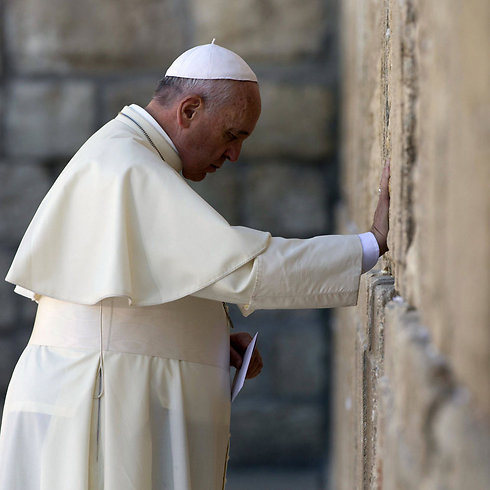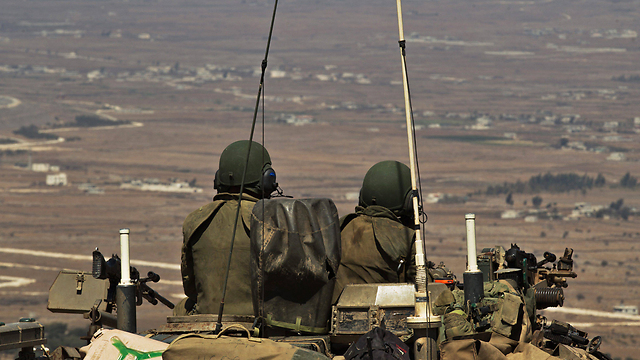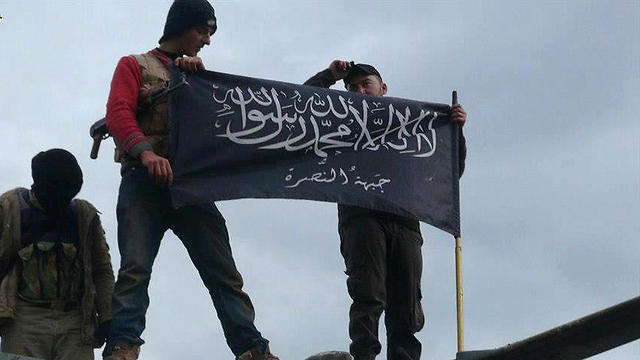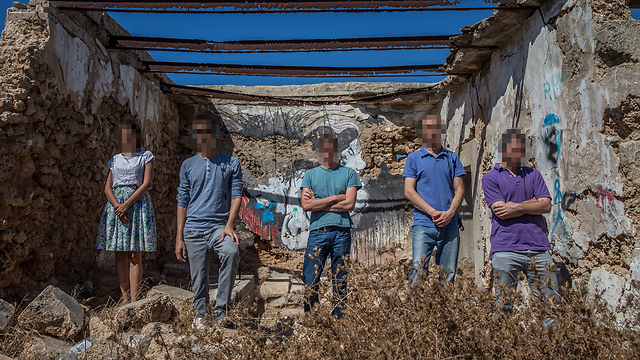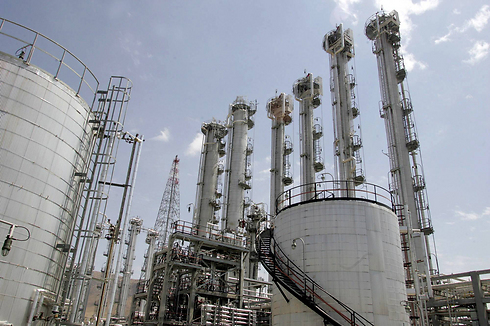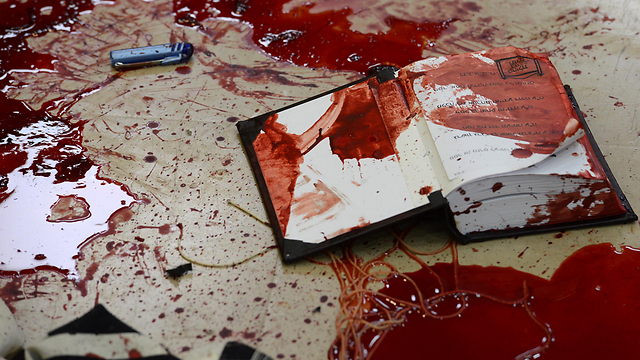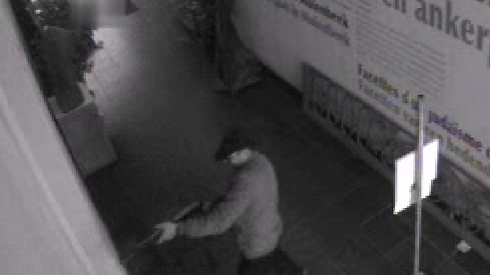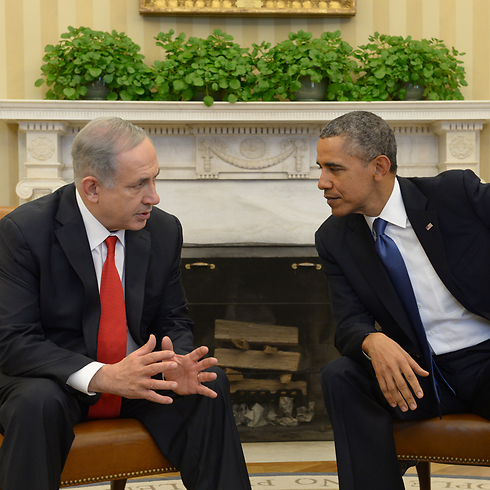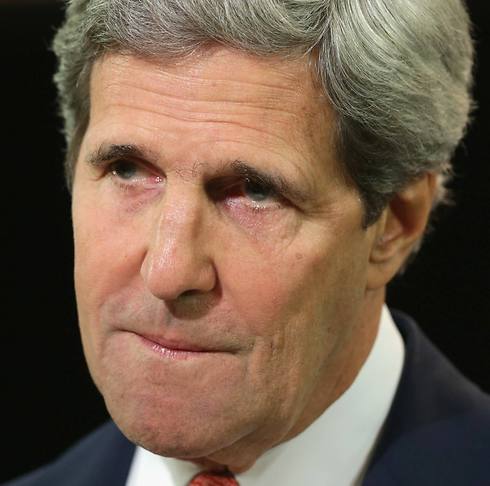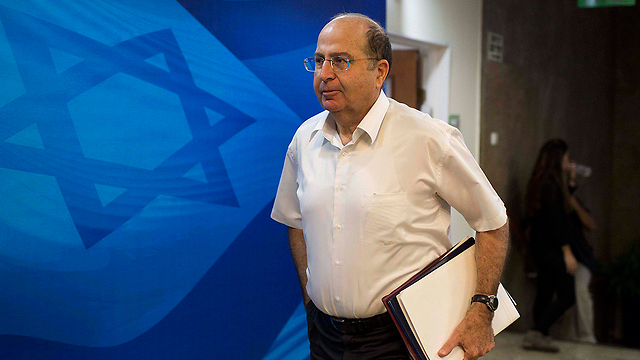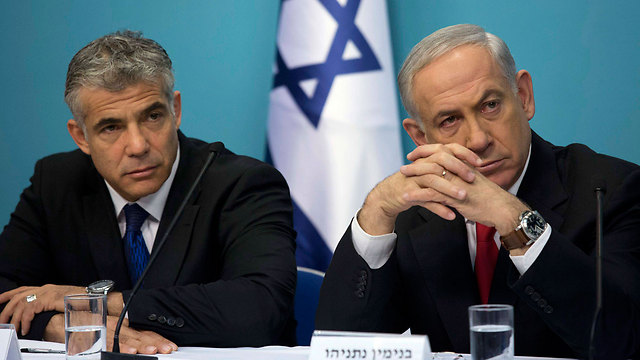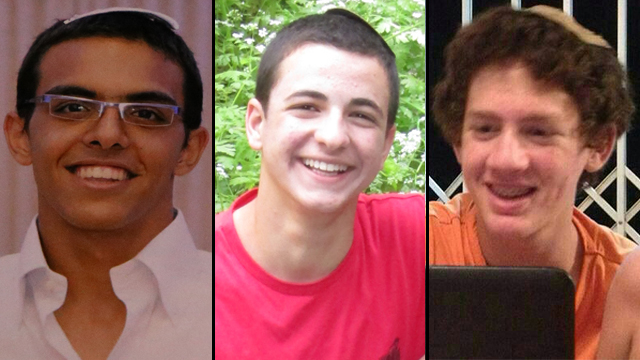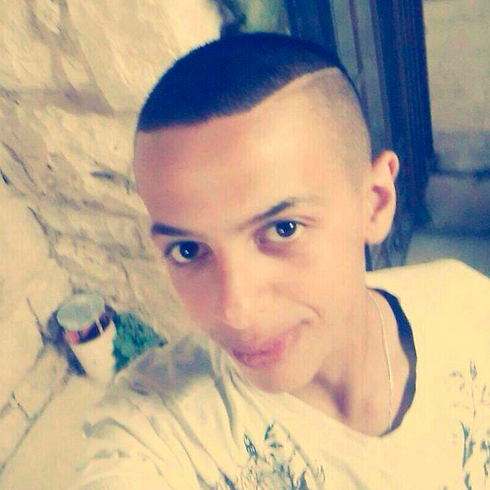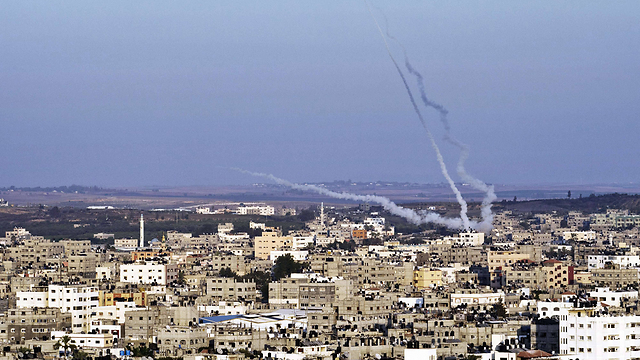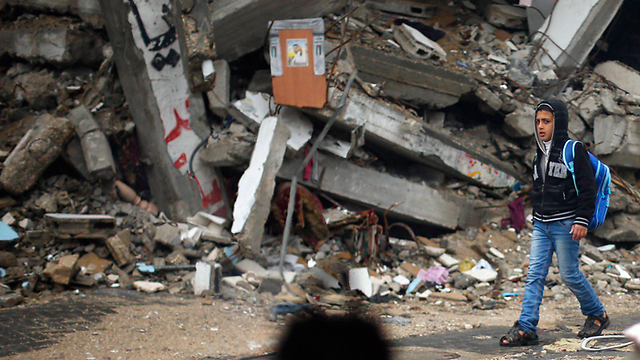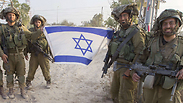
Top 10 stories, events and issues that made Israel in 2014
From the war in Gaza to a papal visit and political infighting, it has not been a boring year in Israel - Ynet has chosen the top ten headlines of the past year.
1. Papal visit
In May, Israel and the region was graced by the presence of one of the world’s most loved and influential figures - Pope Francis.
"I have come here to pray to God to make peace prevail," Pope Francis said this May as he prayed at the Western Wall, one of the most revered Jewish shrines and a sole remnant of their sacred Second Temple, destroyed by the Romans in 70 AD. Like many visitors, he tucked a small written message between the ancient stones before walking away.
During his visit the Pope met with then-president Shimon Peres, whom he praised for his ongoing peace efforts, and with Prime Minister Netanyahu, with whom he jokingly argued about whether Jesus spoke Hebrew or Aramaic. The Pope also visited Yad Vashem, making an unscheduled stop at a memorial for the victims of terror at the request of Netanyahu. He also created some controversy after visiting the West Bank separation barrier and offering to host peace talks between Israel and the Palestinians. Nonetheless, Francis left the region charmed and hoping for more of the charismatic religious leader.
2. Syria spillover / IDF aid wounded Syrians
After four years of civil strife and violent warfare, Syria looks less like a country and more like a patchwork of warring fiefdoms. Though the fighting has no direct connection to Israel, it has been felt - especially along the Golan border Israel shares with Syria, where fighting over the Quneitra Crossing which connects Syria and Lebanon has spilled over into Israel in the form of stray bullets and mortars.
In the passing year, the leakage took the life of a 13-year-old Israeli boy and even saw an IDF officer and two soldiers wounded.
Though Israel’s official policy is one of neutrality, a policy encouraged by both the embattled Syrian regime and the different rebel organizations, its occasional intervention has been inevitable. For example, in November, Syrian tanks entered the demilitarized zone between the two countries for the first time since the 1973 Yom Kippur War, and the IDF has responded after border incidents.
Moreover, according to foreign reports, fears that dangerous arms will reach Hezbollah hands have also allegedly prompted Israel to engage in secret attacks on arms convoys in both Syria and Lebanon, where the pro-Assad Shiite terror group calls home.
The crisis has brought the Israeli side of the Golan a strange new trend of war tourism, in which curious foreigners come to get a first hand look at the civil war raging just a few kilometers away from the safety.
On the other hand, the IDF and Israel have scored a rare public relations win for their work helping wounded Syrians in a specially established field hospital. The stories of their rescue are rarely published for security reasons, but have recently been featured in a Vice NEWS series.
3. Unit 8200 refuseniks
One of the year’s biggest stories was a Ynet exclusive: First published by Ynet’s Palestinian affairs correspondent Elior Levy, a group of elite IDF intelligence officers, penned a letter decrying their role in “facilitating the occupation” of Palestinians in the West Bank.
The officers and soldiers in the IDF's largest, and most elite intelligence unit, known as Unit 8200, address the letter to the prime minister and IDF top brass, in which the 43 signatories said that they refuse to take part in action against Palestinians or, "to be tools to deepen the military regime in the occupied territories."
The crux of their claim was that the top intel unit was first established to fight foreign threats, and that a past assumption that Israeli control over the West Bank would quickly end through a peace deal and the formation of a Palestinian state mistakenly put the Palestinian issue in their crosshairs.
Needless to say the letter sent shockwaves across Israeli politics and military: While some politicians and military leaders slammed the group, some in the public sphere praised them for telling “the truth” and highlighting the ongoing fortification of Israel’s control over Palestinians.
4. Nuclear Iran
One of Prime Minister Benjamin Netanyahu’s favorite talking points, the Iranian issue, has lost some of its international luster after world powers managed to reach an interim deal with the Iranian regime over its problematic nuclear program last year.
However, that deal has still yet to be fully implemented, and it is far from certain the Iranians have even made good on their side of the bargain, as the world has already begun easing the crippling economic sanctions enacted against Teheran.
A recent report by the UN’s nuclear watchdog the International Atomic Energy Agency (IAEA) had insinuated Iran was evading inspections - claims later rescinded. Talks almost ended in embarrassment for Iran after a mysterious blast in one of Iran’s secret nuclear bases was said to be the “smoking gun” behind its nuke program.
Nonetheless, negotiations continue, leaving some concerned Iran is using the time before final deal is reached to develop weaponized nuclear capabilities.
Iran's Foreign Minister Mohammad Javad Zarif, who leads the country's nuclear negotiating team, recently said low-level talks on its nuclear activities would resume in Geneva on Jan 15, with wide gaps remaining in their positions.
5. Rise in "lone wolf" attacks / price tag incidents
Israel was hit by a wave of both "lone wolf" attacks and price tag incidents over the course of the year. The increase in "lone wolf" terrorism marks a shift from violent acts perpetrated by organized groups to those committed by individuals who are not affiliated with a terrorist organization. The perpetrators do not act as part of an organized initiative or by direct order from a group, but receive a boost from the incitement in the Palestinian media and on the social networks, who called for an intifada of knife and vehicular attacks.
The past year saw a series of such attacks – including the terrorist who went on a rampage in an industrial digger in central Jerusalem, the Palestinian who plowed his car into a crowd of people waiting at a Light Rail station in the capital, the terrorist who attempted to murder Rabbi Yehuda Glick, the Palestinian who stabbed an IDF soldier at a Tel Aviv train station, the two terrorists who infiltrated a synagogue in Jerusalem and attacked worshipers, the terrorist who stabbed two people in a Mishor Adumim Supermarket, and the Palestinian who hurled a firebomb at a vehicle carrying a young Israeli girl and her father.
A steep rise in price tag attacks also occurred in 2014. Such attacks refer to acts of vandalism, violence and other hate crimes usually carried out by far-right Jewish extremists, and aimed at the Palestinian population, as well as on frequent occasions the IDF. Mosques, churches, dovish Israeli groups and even Israeli military bases have been targeted by the vandals in recent years.
The latest in the string of price tag attacks occurred on Wednesday, the last day of the year, when a Palestinian home in the West Bank was set on fire after a Molotov cocktail was thrown at it, with its inhabitants still inside. Other attacks that took place over the year include the torching of a Hebrew-Arab bilingual school in Jerusalem, an arson attack on vehicles in the Palestinian village of Far'ata in the West Bank, vandalism at a synagogue in Tel Aviv in protest against the "Nationality Law", the torching of a home in the West Bank's Khirbat Abu Falah village, as well as an arson attack on a mosque near Ramallah, which was closely followed by a firebomb attack on an ancient synagogue in Shfaram.
6. Rise of int’l anti-semitic attacks
Threats and tensions in Israel rarely remain contained within Israel’s small border, and at times can ramify abroad: 2014 has been a very tough and violent year for Jews and Israelis abroad with a number of high profile attacks the Jewish community and its leaders. From a deadly shooting at the Brussels Jewish Museum, which saw three die at the hands of an Algerian born terrorist, to horrific anti-semitically motivated home-invasion assault, rape and theft in France, a record number of incident were reported from around the globe.
Some played into local politics, as was the case in east Ukraine, where Russian-backed rebels attempted to force Jews to register; while others followed the war with Gaza or just allowed hatemongers an easy target, as happened in the Jewish community center shooting in Kansas.
There were others as well: According to the ADL, in Casablanca a rabbi was assaulted; in the Netherlands, a Holocaust memorial was defaced with "free Gaza" graffiti; and in Germany, shouts of "Jews to the gas" were heard during an anti-Israel rally in Gelsenkirchen.
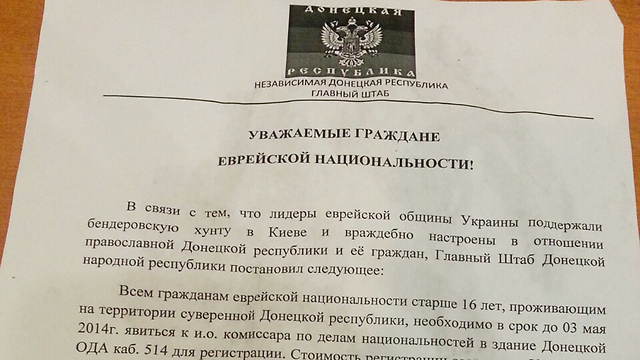
According to the ADL’s Global 100 Survey, released in May, anti-Jewish attitudes were pernicious and pervasive around the world, with one-quarter of the world’s population infected with anti-Semitic beliefs. In France, 37% of the population was found to harbor deeply entrenched anti-Jewish notions.
7. Failed peace talks / US tensions / “chickenshit” and “messianic”
The first half of 2014 was dominated by a new round of US-led peace talks. The negotiations ended with little fanfare at the end of April, but managed to strain US-Israel ties to “crisis” levels. It also saw a large group of Palestinian prisoners go free and pushed Netanyahu’s now-defunct coalition to the brink of dissolution, pitting the centrist parts of the government against the rightists.
The talks had US Secretary of State John Kerry and special envoy Martin Indyk shuttling back and forth from the US to the region to try to get the sides to reach what they dubbed a “framework” agreement which would create a new road map for the peace process. However, the plan soon backfired, and talks reached their deadline without any substantial gain. While Israel blamed the Palestinian unity government, which included Hamas and was formed a mere week before the talks deadline, the Palestinian blamed Israel’s reluctance to release a group of Palestinian terrorist it claimed Israel had committed to.
The US for their part took a slightly more diplomatic path in explaining how talks failed, but a very senior unnamed official told Ynet that the US believed Israel’s settlements were the heart of the matter.
The low point of the peace talks was a report first broken by Ynet, according to which Defense Minister Moshe Ya’alon called Kerry “obsessive” and said his peace efforts were “messianic” the unprecedented comments started a major rift with the US, whose ramifications are still felt today. Only recently, Ya’alon was snubbed by the White House while on a visit to the US.
Moreover, the incident started what can only be dubbed a ‘war of words’ between Israeli and US officials.
The thinly veiled conflict recently boiled over again, with an unnamed US official calling Netanyahu a “chickenshit” in an interview to The Atlantic magazine - harsh comments which put even Ya’alon’s undiplomatic statement to shame. Though the White House denied it was behind the report, the sting and message were clear - the US was not pleased with Netanayhu’s handling of the peace process and subsequent events.
Talks also included a number of embarrassing gaffes for Kerry, who repeatedly found himself in hot water for blaming Israel for the talks’ failure. Kerry was also caught saying that Israel would turn into an “apartheid state” should it fail to reach a peace deal with the Palestinians, and later said that peace talks went “poof” after Israel announced new settlement units and failed to release the prisoners.
Needless to say, he, like Ya’alon, later apologized, and though personal relations seem in bad shape, the two states’ unshakable alliance survives, in many senses stronger than ever.
8. Elections - coalition tensions
If the peace talks didn’t kill Netanyahu’s center-right coalition, infighting did. After almost two years of ongoing bickering between the different coalition partners - from Lapid and Bennett fighting over peace talks, Lapid and Defense Minister Ya’alon at each other's necks over the defense budget, or Bennett and Netanyahu squabbling over comments the former allegedly made - Netanyahu had had enough.
And thus, at the beginning of December, Netanyahu announced new elections after firing Yesh Atid Chairman Lapid and Hatnua leader Justice Minister Tzipi Livni.
The background was what Netanyahu called “open dissent” among the ministers, though the roots of the conflict between the more centrist part of the now-defunct coalition can be found in political and ideological differences as well. Shortly before Netanyahu fired Lapid, a controversial law legally defining Israel as the Jewish nation-state passed preliminary stages, irking Lapid. Moreover, the two had already been on bad terms after Netanyahu froze Lapid’s flagship legislation in the field of housing and Lapid refusal to capitulate to the IDF’s demand for additional funds.

Since the elections were announced, Israel’s political system has been in a tailspin, with new alliances forging - like with the recently announced merger between leftist Labor and centrist Hatnua into the ‘Zionist camp’ bloc - and old ones falling apart - like the disintegration of the Sephardic ultra-Orthodox party Shas, after former chairman Eli Yishai formed an offshoot party and began a massive smear campaign against the current chairman Areyh Deri.
Though Netanyahu’s win is likely to be the outcome of the March 15 vote, the newly formed center-left bloc, as well as former-Likud minister and political wunderkind Moshe Kahlon’s new Kulanu party could depose Netanyahu - or at least deal a serious blow to the Likud’s power.
9. Kidnapping / vengeance murder of Abu Khdeir
Though only a distant memory after the bloody Gaza war, few remember it was predated by a massive escalation in the West Bank and Jerusalem, which began with the horrific kidnap-murder of the three Israeli teens, and boiled over to an equally horrifying vengeance killing by Israeli extremists who kidnapped and burnt to death a Palestinian teen in retribution for the three teens’ murder.
The three Israeli teens, Eyal Yifrach, Naftali Frenkel and Gil-Ad Shaer were kidnapped by Hamas-linked terrorists on June 12, sparking an 18-day manhunt dubbed “Operation Brother’s Keeper” in the West Bank, that ended with the tragic discovery of their bodies.
The massive wave of arrests conducted by the IDF during search efforts saw some 800 Palestinians arrested, a majority of which were linked to either the Hamas or the Islamic Jihad. It was later said that the arrest wave had more to do with a Hamas-led plot to depose Palestinian President Mahmoud Abbas, than finding the boys’ bodies.
On July 2nd, two days after the three boys’ bodies were found, Mohammed Abu Khdeir, a 16-year-old Palestinian from Shuafat, was kidnapped by a group of Jewish extremists, led by Joseph Ben-David, who later confessed to burning the teen alive in a Jerusalem forest.
"We said we would take revenge on the Arabs and go and burn one of theirs, in fact I knew before then that I was going to burn (someone),” Ben-David said in his indictment hearing.
The story shocked Israel and the world, prompting everyone from rabbis to Netanyahu himself to condemn the killing and promise to work to bring those behind it to justice.
10. Gaza war
After Operation Brother’s Keeper, and fueled by the horrific death of Abu Khdeir, tensions were at a record high. Further spurred by the West Bank arrests, Gaza terror factions began shooting rockets at Israel’s southern communities, springing Israel’s now world-famous missile defense system Iron Dome into action. The insufferable rocket fire on civilian population prompted retaliation from the IAF, leading to an additional escalation and eventual full-on conflict.
And thus, Operation Protective Edge was announced on July 7 following a massive increase in rocket fire from Hamas, which reached up to 70 rockets a day.
The operation was expanded to include a ground operation on July 17 and the IDF called up its reserve forces. The goal of the operation shifted over the summer, but it was clear the IDF was working to dismantle Hamas’ military - as opposed to political - infrastructure; targeting rocket launchers, its complex underground network of terror tunnels and military leadership.
The operation, which felt more like a war, lasted a massive 50 days and saw countless rockets slam into Israel, sending Israelis to the shelters during the sweltering summer heat. After a number of failed cease-fire attempts, almost all of which were broken by Hamas and Gaza terror factions, by September, the fighting had calmed.
However, the calm is little comfort to the families of the 72 Israelis - only six of them civilians and the rest IDF soldiers - who died during the conflict. Hamas for its part had little to show when the dust had settled, with over 2,000 Palestinians (with disputed numbers of combatants and civilians) killed and large parts of Gaza Strip reduced to rubble.
Four months afterwards, renewed rocket fire has already begun to trickle, with three rockets hitting Israel since the ceasefire was agreed on, and reports saying Hamas is already rebuilding its military capabilities. The ceasefire agreement seems shaky, and though Israelis know Iron Dome can mitigate the threat of rockets, they also know Gaza is a powder keg which could explode at any moment.
Yoav Zitun, Attila Somfalvi, Elior Levy, Noam (Dabul) Dvir, Itay Blumenthal and Omer Benjakob contributed to this report










